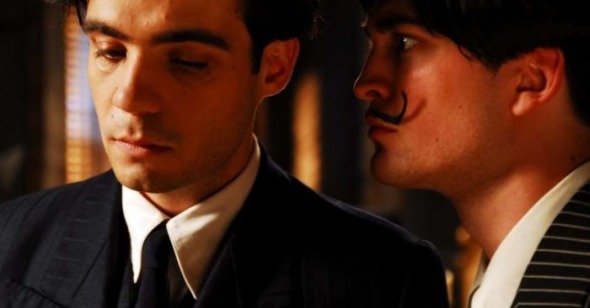Poetic Licentiousness
by Sarah Silver
Little Ashes
Dir. Paul Morrison, UK, Regent Releasing
The first thing that came to my mind when I heard that Twilight heartthrob Robert Pattinson would play a young, sexually confused Salvador Dalí in Little Ashes, was of Leonardo DiCaprio as Arthur Rimbaud in Agnieszka Holland’s unusual Total Eclipse (1995). In fact, several parallels can be drawn between the two films: iconic present-day Anglophone "It boy” is cast as foreign artistic iconoclast of yesteryear, forbidden affairs with fellow male artists ensue, and it all ends tragically because bourgeois society is not as open-minded as the artistes of the Avant-garde—and because brooding romantics have a penchant for destroying their relationships. However, Little Ashes is a far more coherent film than Total Eclipse, drawing (whether deliberately or subconsciously) on a smattering of Queer Cinema references, from Bette Davis melodramas to the glitter-fantasias of James Bidgood, in a way that’s so over-the-top it just about works.
The film, which focuses solely on the early lives and careers of its subjects, takes place largely at the Residencia de Estudiantes in Madrid, which pulsates with the excitement of new ideas and the beauty of fresh talent. Young intellectuals, among them Federico García Lorca (Javier Beltrán) and Luis Buñuel (Matthew McNulty), tear through the hallowed halls of their school with cocky self-assurance until a mysterious and private young man arrives and captures Lorca's attention. Dalí’s entrance onto the scene is shrouded in mystique; when he exits his carriage, we only see his garish shoes before the camera pans up to reveal his dandy wardrobe, complete with ruffled shirt and a cockamamie bob every bit as distracting as Anton Chigurh's. While Ashes was in the can before Pattinson branded himself onto the brain of every 13-year-old girl (and inner 13-year-old-girl) as the smolderingly chaste vampire Edward Cullen, his portrayal of Dalí, in this post-Twilight era, reads as a spookily close incarnation of the same character. Skulking in doorways and spying from windows, Dalí quietly admires Lorca from a safe distance. In fact, Dalí doesn’t speak until several scenes in, giving him the silent allure of a melodrama heroine, except for the fact that his awkward bug-eyed stares from behind that crusty wig are more discomfiting than enchanting. Thankfully, his capriciousness prompts him to change his coif early on, opting for a slickly handsome combed-back hairstyle.
Despite the ’do, Lorca is enthralled almost immediately by Dalí, but the latter, as admiring as he is of Lorca’s work and essence, will not make his intentions clear. What one might deem their “Brideshead moment,” when Lorca makes a bold move to get a reaction one way or the other, comes when the two are on holiday. Awash in indigo and silver moonlight, the boys splash around playfully in a foamy white sea; the emotions may be messy, but the photography is crisp and clear, the better to fetishize Beltrán and Pattinson's young bodies as they radiate blue light like Bidgood's "Blue Boy from Pink Narcissus.”
Dalí’s dalliance with Lorca upsets Buñuel, whose rampant homophobia (which reads as anger for being locked out of his close friends’ mutual experience) prompts him to gay bash on campus. Once he discovers their affiliation, he begins to disassociate himself from them. But, years later, the alliances shift, and it is Dalí and Buñuel who unite in Paris to make their surrealist short Un Chien andalou, an allusion, the paranoid Lorca is quite convinced, to him, as he is “the only Andalusian they know.” By this point, Dalí has repressed his homosexual urges, further alienating Lorca, who is in the process of accepting himself as gay.
There are politics in Little Ashes, as well as perfunctory nods to the oeuvres of Dalí, Lorca, and Bunuel, but none of that feels particularly vital. The film is, at heart, a relationship melodrama, focusing on universal experiences such as the mutability of friendship and the sting of rejection. Stressing the detrimental psychological effects of bottling up one’s instincts and desires, the film has a tension running throughout that faintly echoes the volatile sexuality of The Talented Mr. Ripley. As Lorca becomes more and more well adjusted as an openly gay artist and political activist (and Buñuel, apparently having experienced some form of enlightenment, shifts his alliances back towards Lorca), Dalí withdraws into a shell, presenting the world with ever-changing masks of himself, while having a nervous breakdown in private.
While Pattinson may be the name that draws the crowd (and his performance is certainly discussion-worthy), the most fluid interpretations here come from Javier Beltrán as Lorca and Marina Gatell as Magdalena, his rejected girlfriend who becomes his closest companion and constant supporter. Some of the film’s intentionality may be difficult to decipher (is Pattinson’s fish-out-of-water act as Dalí indicative of sheer brilliance or mere callowness?), and some choices baffling (the cacophonous recitation of Lorca’s poems in Spanish, with simultaneous English translation dubbed over top), but I can attest to having been moved by Little Ashes, perhaps in the quietest moments when it wasn’t even trying.
